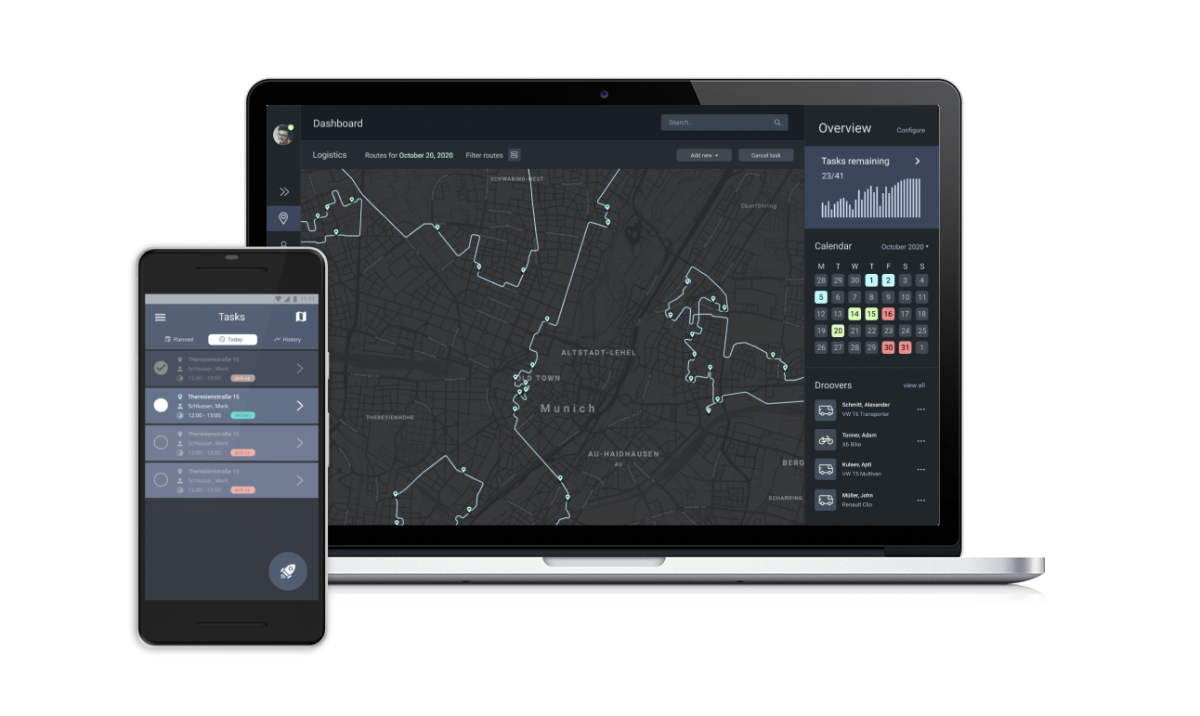Munich Startup: Who are you and what does Droov do? Please introduce yourself!
Droov: We are Vladimir Fomenko, Dmitry Burlakov, and Isa Usmanov.We met during our studies at TU Munich: Dmitry and Isa got to know each through organizing a big business event, while Vlad and Isa met at UnternehmerTUM working on a project. All three of us individually have already tried a hand at entrepreneurship. And after getting more experience in academia and the corporate world, we found a sustainable business idea together and launched our venture in 2019.
As a team, we have a broad and complementary academic background and working experience. Management, and Product Development (Isa, 24), Software Engineering, and Artificial Intelligence (Vlad, 23), Informatics, and Business Administration (Dmitry, 24).
Droov: Satisfying the growing demand for delivery services
Munich Startup: What problem does your startup solve?
Droov: E-commerce has been steadily growing for years and consumers are becoming increasingly sophisticated, demanding more convenience from goods and service delivery. At the same time, the “buy local” trend is strengthening. Consumers prioritize purchasing products and services from local players. Needless to say, COVID-19 pandemic has also strongly affected consumers’ shopping habits.
However, businesses from a variety of industries including food and beverages, retail, laundry, pharmacy, flower shops, farmers, and more, are struggling to scale operations and adapt to the growing demand for home delivery service.

This is where our solution comes into play: Droov is a last-mile delivery management and optimization software that provides businesses with customizable solutions to delight their customers with delivery service. Also, we enable them to optimize routes, navigate and manage the fleet, grow sales and customer satisfaction rates.
While helping businesses on the revenue side, we developed Droov with the environment in mind. Due to the growing consumer demand, the number of delivery vehicles in the world’s top 100 cities by 2030 is projected to rise by 36%, resulting in an emissions increase of over 30%. Our goal is to reduce emissions by more than 20%, providing businesses with our proprietary route optimizing tools.
Pivoting was a result of many ups and downs with a lot of learning
Munich Startup: But that’s nothing out of the box!
Droov: The B2B SaaS last-mile logistics market is pretty crowded, indeed, with many solutions taking different approaches. We, however, found out that to set up most solutions in a proper way, one would need the help of a couple of consultants. We strongly differentiate in that – our plug-and-play platform is so easy and intuitive to set up, that every grandma can start a delivery service within a few minutes. This doesn’t mean our solution offers fewer features than the competitors’. We have focused on the art of The Complexity of Simplicity. Seamless to use, our software is powered with state-of-the-art technology for route optimization, tracking, order, and resource management.
Munich Startup: What have been your three biggest challenges so far?
Droov: What we do offer now was not the idea that we started with, but our pivoted business resulted from many ups and downs with lots of learnings. At the beginning of 2020, we launched Reinio, and after successfully serving customers for a few months (almost just when the pandemic started), we have realized that the scope of the developed logistics software combined with the integrated ordering system is a great offering for a much broader audience than the laundry sector alone.
We decided to pivot our business model, – and that was not easy to simply put an end to operating business in order to focus on something new, on something bigger. None of the decisions we have made along the way are regretted because all of them are the result of in-depth analysis, hundreds of hours of research, receiving mentoring from experienced advisors, and endless nights of work.
Planning to close a seed round in 2020
Munich Startup: How is the business going?
Droov: We are currently onboarding our first business client – one of the biggest dry-cleaning companies in Munich. We also receive interest from SMEs from retail, mobility, and cleaning industries that want to operate with us.
Our team is growing: by the middle of September we will be a team of 11 bright minds. But we are not stopping there and plan to expand further.
Last but not least, we plan to close a seed round in the fourth quarter of 2020.
Munich Startup: What do you think about Munich as a startup location?
Droov: Munich is a city where culture and tradition intersect with modernity and high energy, making it unique as a startup hub. We are very grateful to the local startup ecosystem, being a part of the UnternehmerTUM Incubator, LMU Entrepreneurship Center Accelerator, and other communities. The number of Munich startups is growing rapidly, at the same time with venture capital and angel investor groups. The government support and sponsorship has also been a notable factor for the ecosystem development that we appreciate.
Munich Startup: Zoom or face-to-face?
Droov: Depends on with whom. Just kidding. A smart mix! We seem to have learned to combine both quite well.



